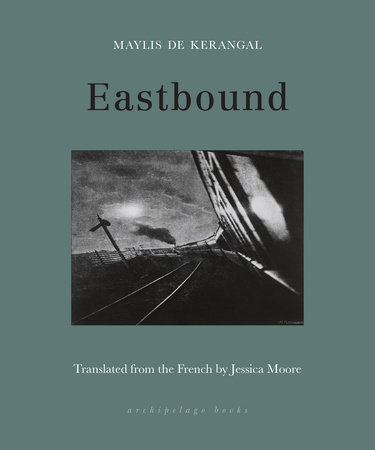"Eastbound briskly unfolds the events of this crazy but thrilling little Mission: Impossible, allowing itself speedy diversions into the backgrounds of both Aliocha and his accomplice . . . . The crisp cascading sentences; the delicious mixture of fear and romance; the harmonious balance of story and language: these are characteristics of each of Ms. de Kerangal's books."
— Sam Sacks, Wall Street Journal
"In Maylis de Kerangal’s luminous vision, conveyed by the inspired translator Jessica Moore, Siberia’s immensity dwarfs human perspective. The insecurity of existence across this vastness and on board the train emphasizes the significance of human connection. In a time of war, this connection may bring liberation and salvation."
— Ken Kalfus, New York Times
“De Kerangal is a master at building suspense . . . This book is not only a sort of miniature masterpiece of narrative tension and compression, it's also memorably cinematic. De Kerangal captures the claustrophobic closeness of the train cars and the compartments teeming with passengers, all with different agendas and objectives, with the same level of detail that she evokes the landscape, this vast Siberian forest, and lakes and sunsets that we encounter outside the train window.” — Emily Eakin, The New York Times' "The Book Review" podcast
"The physical book…has this very appealing feel in your hand. It's just a beautiful package of a book. It’s worth getting your hands on." — The New York Times' "The Book Review" podcast
“In this slim, sleek tale that hurries along at the speeding train’s clip, de Kerangal draws on classic train capers while also poetically, ravishingly conveying the immensity and harsh beauty of this haunted land of exile and torment . . . With each new novel, de Kerangal secures her place as a writer of stunning, incisive, enrapturing fiction; it’s a boon to have this sensuous, soulful, and suspenseful earlier work so gorgeously translated into English by Jessica Moore.”
— Donna Seaman, Booklist
"Impeccable . . . De Kerangal’s triumphant achievement is powered by mellifluous prose with a rhythm as steady as the train. Readers are in for a dazzling literary ride." — Publishers Weekly, starred review
“An antiwar story in which no bullets are fired and not a single battle is fought . . . Sneakily funny . . . As he anxiously ponders the “woolly mauve wilderness,” in translator Moore’s inspired phrasing, it’s evident that Aliocha is a casualty of the militaristic posture that has such a warping effect on people and nations.” — Kevin Canfield, World Literature Today
"As a choreographer knows, if you place a man and a woman on the stage even in an abstract ballet, you already have a story. As Maylis de Kerangal, one of the three or four best French novelists working today, reveals, the story need not be one of physical desire but of shared loneliness and the longing for escape—and of mammalian empathy." — Edmund White
"On the Trans-Siberian railroad an encounter between a young Russian conscript and a French woman becomes a gripping tale of loneliness and escape. Told with lyrical precision, Eastbound is a rare feat: razor sharp and abundant in human emotion. It's difficult to think of a writer who does so much, so well, in so few pages. Breathtaking." — Mark Haber, Bookseller at Brazos Bookstore in Houston, Texas
"Eastbound is a novella told in a single breath, quick as a light turned on; intense, precise, unconditional, potent. Jessica Moore’s translation is masterful." — Anne Michaels, author of Fugitive Pieces
"Eastbound is a compassionate thriller, one where suspense is created around the question of whether one person will aid another. It asks us to remember our humanity and the humanity of others. something which goes beyond nationality and language." — Grant Rintoul, First Reading
"In this timely novella about a Russian military conscript defecting from the army, 20-year-old Aliocha is on the Trans-Siberian railway from Moscow to Vladivostok, spanning almost a quarter of the Earth’s circumference . . . A balance of internal thought and external action propelled by a narrative that races on in long sentences, keeping things flowing beautifully in between moments of drama." — John Self, The Guardian
"Though first published in France 10 years ago, there is a contemporary resonance to this slender tale of a young Russian conscript, Aliocha, trying to escape the army on the Trans-Siberian railway and encountering Hélène, a fellow fugitive in flight from her own past." — Ángel Gurría-Quintana, Financial Times, "Best Books of 2022"
"What is perhaps most stunning about this novel is the narrative potential available at every turn, despite the lack of a significant plot. Even to each other, Aliocha and Hélène’s faces are canvases to be read and interpreted, as is the vast Siberian landscape, visible primarily through the train window. The fact that the narratives conjured by Aliocha and Hélène about Siberia and one another are only just that—stories—somehow makes the process of reading all the more dynamic." — Samantha Kathryn O'Brien, Barrelhouse Magazine
"Taut and tense with moments of pure beauty. One thrilling train ride across a foreign landscape that allowed me to experience a conscript's desperate plight and the connections that can bloom between strangers in unexpected moments." — Hannah Harlow, Book Shop of Beverly Farms in Beverly Farms, Massachusetts
"This 127 page gem of a book should be in print now with all the news of new conscripts in Russia reluctantly heading to Ukraine. Aliocha is a new conscript heading to Siberia, miserable, who befriends Helene, a frenchwoman, traveling East on the same train. Beautifully written and translated, this book packs a current punch in its very relatable story." — Annie Philbrick, Bank Square Books in Mystic, Connecticut
"Meet Helene & Aliocha, a pair of people seeking to leave similar but utterly distinct circumstances: he is a young Russian kid avoiding military conscription; she is a French woman approaching middle-age, fleeing a relationship that has left her existentially stranded and without comfort in Siberia. They encounter one another in the dark corridors of a train on the Trans-Siberian railway, and become, over a cigarette, unlikely compartment-mates and co-conspirators. His desperation interacts with her isolation in remarkable ways, given that they do not share a language. Their harrowing adventures include the avoidance of a lecherous military bureaucrat, as well as a tangle with the corps of former Soviet operatives working as train attendants. All the while, the pair must parse the strained, vivid memories & experiences of their respective pasts (and presents) as they are both propelled towards an uncertain future." — Danielle King, Left Bank Books in St. Louis, Missouri
"An emotional thriller in miniature, this slim, brisk book had me on the edge of my seat and emotionally invested in these characters until the very end. The poetic language is the work of a singular and transfixing talent." — David Vogel, Literati Bookstore in Ann Arbor, Michigan
In mysterious, winding sentences gorgeously translated by Jessica Moore, De Kerangal gives us the story of two unlikely souls entwined in a quest for freedom with a striking sense of tenderness, sharply contrasting the brutality of the surrounding world. — James Harrod, Bookseller at Malaprop's
"The exciting tension permeating the novel reminds me of the accounts of escapes that Solzhenitsyn recounted in Volume 3 of The Gulag Archipelago. Aliocha’s desperate and confused efforts to run away compels our sympathy; the suspense over whether he will be caught or not is riveting." — Russian Life
"This is no Brysonesque travelogue but a taut, tense work using the train as a backdrop for a story of two very different people . . . Eastbound is an intriguing book . . . in the hands of an accomplished writer and translator, a book that you’ll fly through." — Tony's Reading List
“From the opening pages, de Kerangal’s prose carries the emotional intensity swelling in the cramped quarters of the train, the Siberian landscape rushing past the windows, and the increasingly fraught atmosphere of the station breaks without dropping a beat . . . [De Kerangal's] characters emerge as full-bodied, conflicted individuals and the suspense, which starts out as a simmer, builds to an intense boil.” — Joseph Schrieber, Rough Ghost
"Jessica Moore’s translation meets the pivoting demands of De Kerangel’s prose — preserving the terse, staccato sentences that relate action inside the train, and ably handling the flowing descriptions of the Russian landscape . . . Without a common language, Aliocha and Helene operate in parallel, each one a closed system incapable of fully intersecting. Their relationship, born of coincidence more than abiding connection, illuminates the fraught relations between the West and its Russian antagonists." — Tara Cheesman, On the Seawall
Eastbound is a marvel. Racing through space and time like a train, Maylis de Kerangal perfectly captures the dual nature of fleeing and entrapment. Jessica Moore's translation conveys an impeccable tension—how will a soldier escape the crisis of enlistment? I loved this book.
— Makenna Goodman, author of The Shame
“In interviews, de Kerangal has reflected on the importance of being a “contemporary writer”—someone who holds “all the layers of time together.” This does not mean, I think, that she mixes them, but that they remain striated, defined, like an ancient lake seen through the window of a passing train via a smartphone screen . . . It takes immense skill, patience, and clarity to paint time, to render the melee of past and present, symbolic and real. Language may not be what allows us to see it, but in the right hands we can get close.” — Lauren Oyler, The New Yorker
"Inner and outer immensity is luminously portrayed in this novel. The narrative might tunnel in to describe Hélène registering the “slowed down flow” of Aliocha’s blood, as he sleeps in her train compartment, or pull back for the monotony of what’s outside the train window . . . a gorgeous English translation by Jessica Moore." — Debra Spark, Frenchly
"A tense, poetic novella . . . Aliocha, a reluctant conscript, was heading for a period of military service that was bound to be, in the Russian tradition, brutish, unpleasant, and scarred by vicious bullying . . . It is hard to read Eastbound now without moving it into 2023 and imagining that Aliocha's ultimate destination will be the killing fields of Ukraine and death in the pursuit of a tyrant's atavistic dream." — Andrew Stuttaford, The New Criterion
"I read Maylis de Kerangal’s short novella Eastbound earlier this year, which is about a young Russian conscript who, once aboard the Trans-Siberian rail, decides to desert and meets a French woman who helps him. I haven’t stopped thinking about it . . . De Kerangal reminded me how transportive it is when an author successfully creates that itching desire to know what happens next—without forgoing an ounce of style." — Maya Chung, The Atlantic
"The English translation of Eastbound features evocative, descriptive prose that constructs the world of Aliocha and Héléne in brilliant detail without slowing the relentless momentum of the story." — Ryne Clos, Spectrum Culture
“Virtually every moment of this slim, gripping, gorgeously translated novel takes place aboard a smoky, congested trans-Siberian train rushing east. Among the passengers are 100 Russian army conscripts in third class, one of whom is a scared, tragically innocent 20-year-old named Aliocha, who’s desperate to desert before the sickening train reaches its destination . . . Eastbound is riveting whether or not you read it with the war in Ukraine in mind . . . Aliocha meets an older French woman, Hélène, who’s got her own problems . . . Though they can only communicate in gestures, Aliocha begs for Hélène’s help, and the lengths they eventually go—and the repercussions—will do a number on your heart.” — Jeff Giles, Vanity Fair's BEST BOOKS OF 2023
“Set aboard the Trans-Siberian Express, Eastbound is a stunning, propulsive, and suspenseful novella of fugitives, flight, and freedom … Thundering like a juggernaut, and teeming with nerve-wracking tension, Eastbound soars thanks to Kerangal’s gorgeous, haunting prose with its musical cadences and potent energy.”
–– Radhika Pandit, Radhika’s Reading Retreat








